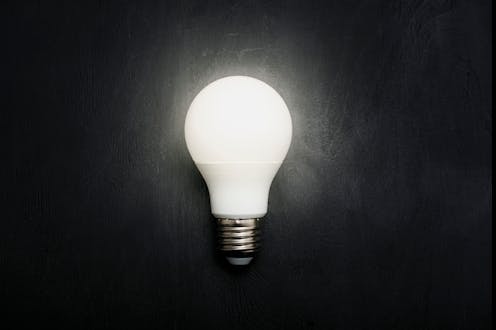What has the Nobel Prize in Physics ever done for me?
- Written by Karen Livesey, Senior Lecturer of Physics, University of Newcastle

Each October, physics is in the news with the awarding of the Nobel Prize. The work acknowledged through this most prestigious award often seems far removed from our everyday lives, with prizes given for things like “optical methods for studying Hertzian resonances in atoms[1]” and “elucidating the quantum structure of electroweak interactions[2]”.
However, these lauded advances in our basic understanding of the world often have very real, practical consequences for society.
To take just a few examples, Nobel-winning physics has given us portable computers, efficient LED lighting, climate modelling and radiation treatment of cancer.
Thin magnets and portable computers
In 2007, the physics Nobel was awarded jointly to Peter Grünberg and Albert Fert for the discovery of “giant magnetoresistance[3]”.
In the late 1980s, Grünberg and Fert (and their research groups) were independently studying very thin layers of magnets. They both noticed that electricity flowed through the layers differently depending on the direction of the magnetic fields.
These teams were looking to understand fundamental properties of very thin magnets. However, their findings led to something we now take for granted: portable computers.
At the time, most computers stored information on a hard disk drive made of a magnetic material. To read the information from the drive, a very small and very accurate magnetic field sensor is needed.
The discovery of giant magnetoresistance allowed for the development of far more sensitive sensors, which in turn made hard disk drives and computers smaller. (Today, magnetic hard disk drives are being overtaken by even smaller solid state drives[5].)
Read more: How to store data on magnets the size of a single atom[6]
In short, we would not have laptops without the discovery that won the 2007 Nobel Prize in Physics.
The effect of this research – like that of so much fundamental research – was completely unanticipated.
A light bulb moment
Sometimes, however, physics research does have a practical goal all along. One such example is the quest for energy-efficient lighting.
Old-fashioned incandescent light bulbs are highly inefficient. Because they work by heating a wire until it glows, they waste a lot of energy as heat. In fact, less than 10% of the energy they consume goes to producing light.
In the 1980s, scientists realised light emitting diodes, or LEDs – small electronic components that emit light of a specific colour – would make more efficient light sources. But there was a problem. Although red and green LEDs had been developed in the middle of the twentieth century, nobody knew how to make a blue LED.
LEDs are thin sandwiches of materials that respond to electricity in a very particular way. When an electron moves from one energy level to another inside the material, it emits light of a specific colour.
All three colours of light (red, green and blue) would be needed to produce the kind of white light people want in their homes and workplaces.
In the early 1990s, in the culmination of almost 30 years of work by many groups, the missing blue LEDs were found. In 2014, Isamu Akasaki, Hiroshi Amano and Shuji Nakamura received the physics Nobel[8] for the discovery.
The layers of material chosen to make up the sandwich, plus the quality of each layer, had to be refined in order to make the first blue LED. Since the initial discovery, materials scientists have continued to improve the design and manufacture to make blue LEDs more efficient.
Read more: Your phone screen just won the Nobel Prize in physics[9]
Lighting accounts for up to 20% of total electricity consumption. LEDs use roughly one sixth as much energy[10] as incandescent light bulbs. They also last much longer, with a lifetime of around 25,000 hours.
Climate models, radiation and beyond
Environmental endeavours are probably not what springs to mind when you think of the Nobel Prize in Physics. Yet another example also comes to mind, the study of a chaotic and complex system with great importance to us all: Earth’s climate.
Half of the 2021 Nobel Prize in Physics was given to Syukuro Manabe and Klaus Hasselmann, scientists who developed early models for Earth’s weather and climate[11]. Their work also linked global warming to human activity.
Of the 222 people awarded the physics Nobel since 1901, only three have been women[13]. The most famous of those three is perhaps Marie Curie, who took home one quarter of the prize in 1903.
Curie’s work on understanding how atoms can decay into other kinds of atoms, producing nuclear radiation, profoundly changed life in the twentieth century.
The study of nuclear radiation led to the development of nuclear weapons, but also to radiation treatment for cancer. And further, it has led to carbon dating to determine the age of artefacts, allowing us to better understand ancient civilisations[14].
So when we find out who is awarded the 2023 Nobel Prize in Physics, no matter what it’s for – and prospects include research on quantum computing, “slow light” and “self-assembling matter” – we can be sure of one thing. The awarded research will likely end up affecting our lives in extraordinary ways that may not at first be apparent.
References
- ^ optical methods for studying Hertzian resonances in atoms (www.nobelprize.org)
- ^ elucidating the quantum structure of electroweak interactions (www.nobelprize.org)
- ^ giant magnetoresistance (www.nobelprize.org)
- ^ Shutterstock (www.shutterstock.com)
- ^ solid state drives (en.wikipedia.org)
- ^ How to store data on magnets the size of a single atom (theconversation.com)
- ^ Shutterstock (www.shutterstock.com)
- ^ received the physics Nobel (www.nobelprize.org)
- ^ Your phone screen just won the Nobel Prize in physics (theconversation.com)
- ^ one sixth as much energy (www.sustainability.vic.gov.au)
- ^ early models for Earth’s weather and climate (www.nobelprize.org)
- ^ Wikimedia (en.wikipedia.org)
- ^ only three have been women (theconversation.com)
- ^ ancient civilisations (www.ansto.gov.au)
Read more https://theconversation.com/what-has-the-nobel-prize-in-physics-ever-done-for-me-208859

















